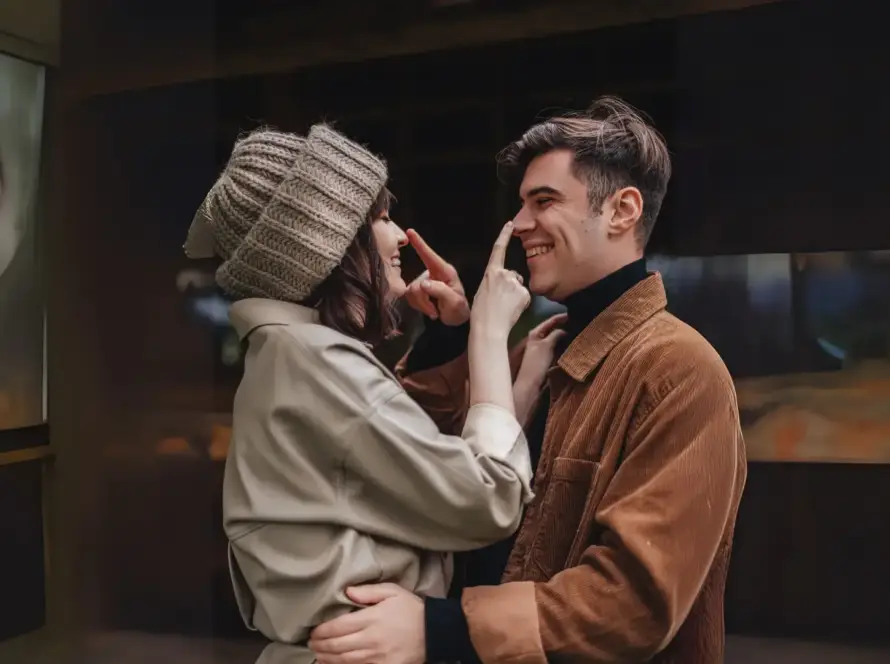
Philophobia.
Sounds fancy, right?
Like a rare flower or a type of exotic cheese.
But no, it’s actually the fear of love.
If the idea of romance makes you sweat like you’re on a first date with a lie detector test, you might have philophobia.
Love should feel like butterflies, soft music, and staring into someone’s eyes.
But for some, it feels more like running from a serial killer in a horror movie.
If you’ve ever bolted at the first sign of emotional intimacy, congratulations, you might be a philophobia pro.
Philophobia Is More Than Just “I Like Being Single”
Some people are happily single.
That’s different.
Philophobia isn’t just enjoying solo Netflix nights and having a deep bond with your pillow.
It’s an actual fear, like, heart-pounding, panic-inducing, “get me out of here” fear.
It’s not about avoiding bad dates.
It’s about feeling like love is an actual threat.
The idea of a relationship doesn’t just make you uncomfortable…it makes you feel trapped!
Like someone just locked you in a room full of couples planning their weddings.
And here’s the thing: a lot of people with philophobia don’t even realize they have it.
They just think they “aren’t relationship people.”
They convince themselves they’re too busy, too picky, or just not interested.
But deep down, it’s not that they don’t want love.
It’s that love feels too risky.
Philophobia doesn’t always show up as “I hate relationships.”
Sometimes, it looks like:
- Only dating people who are guaranteed to leave (long-distance, emotionally unavailable, already in a relationship—yikes).
- Feeling suffocated the second someone gets emotionally close, even if you like them.
- Breaking up the moment things get serious, then blaming it on “gut feelings.”
- Thinking love makes people weak, irrational, or boring.
- Telling yourself, “I’ll date when I’m ready,” but never actually feeling ready.
It’s a sneaky fear because it hides behind logic.
“Relationships are too much work.”
“I like my independence.”
“I just haven’t met the right person.”
All sound reasonable, right?
But sometimes, they’re just excuses for avoiding the thing that terrifies you: real emotional intimacy.
And let’s be real, modern dating doesn’t exactly help.
If you already have philophobia, dating apps are like a buffet of escape routes.
Ghosting is normal.
Non-committal “situationships” are the new thing.
You can spend years pretending you’re open to love while actually running from it.
But here’s the kicker: philophobia doesn’t actually protect you from heartbreak.
It just makes you lonely in a different way.
You’re not avoiding pain, you’re just choosing a different kind of pain.
The “what if I’m missing out?” kind.
The “why do I feel disconnected from everyone?” kind.
So no, it’s not just a preference for being single.
It’s fear dressed up as logic, and it’s trickier than most people realize.
Where Does Philophobia Even Come From?
It doesn’t just pop up overnight.
There’s usually a reason behind it.
Some common causes:
- Trauma from past relationships.
A breakup so bad it made you rethink life choices?
That could do it.
If you’ve ever trusted someone who turned out to be a human red flag, your brain takes notes. It learns that love = pain, and pain should be avoided.
- Childhood experiences.
Grew up watching messy divorces?
Witnessed adults treating love like a battlefield?
That sticks with you.
If your early examples of love looked more like emotional gladiator fights, it’s no surprise you’d rather not enter the arena.
- Abandonment issues.
If people you trusted left, your brain learns to avoid attachment.
This isn’t just about romantic relationships, it could be a parent who walked away, a best friend who suddenly dropped you, or even small moments of rejection that built up over time.
- One epic ghosting experience.
Sometimes, one person disappearing like a magician is all it takes to never trust again.
When you get attached and they vanish, it leaves a scar.
You start thinking, “Never again. I’ll leave before they do.”
- Unspoken family rules.
Some families treat love like it’s dangerous.
Maybe you grew up hearing, “Never trust anyone,” or, “Love makes you weak.”
Those messages stick harder than gum on a shoe.
Even if you want love, your brain is trained to see it as a risk.
- Success = No Time for Love.
If you were raised to value independence, relationships might feel like a distraction.
Some people learn to associate love with failure, like if you fall for someone, you’ll lose focus on your goals.
Philophobia can disguise itself as hyper-independence, making it easy to reject love before it even starts.
- And then there’s the overthinkers.
Some people don’t even need a bad experience, just the idea of heartbreak is enough.
They’ve seen enough rom-coms, overheard enough breakup horror stories, and read enough internet threads about betrayal to decide, “Nope, not doing this.”
What makes philophobia tricky is that it’s rational in a way.
Love does involve risk.
People do get hurt.
But living in constant fear of it?
That’s like never leaving your house because you might trip on the sidewalk.
Sure, it’s possible.
But is it worth missing out on everything else?

Weird, Lesser-Known Signs of Philophobia
Most people think philophobia means running from relationships, but it often disguises itself in subtle, unexpected ways.
It can make you panic when someone texts back too fast, leaving you wondering why they’re so available.
The overthinking kicks in: are they a scammer, a robot, or just too into you?
Suspicious!
Then there’s the classic self-sabotage.
When a relationship feels too good, your brain sounds the alarm: This must be fake!
You start nitpicking their habits, questioning their motives, and suddenly, their completely normal way of breathing is reason enough to leave.
Even love songs can make you cringe.
While everyone else swoons over heartfelt lyrics, you roll your eyes and mutter, Get a grip.
Kind gestures don’t sit right either.
If someone buys you coffee, your first thought isn’t “Oh, how sweet!” but rather, What’s their angle? Are they trying to steal my kidney?
Instead of embracing real connections, you might feel safest obsessing over crushes that will never happen: celebrities, taken people, or someone conveniently living three time zones away.
Dating becomes a strategic game of escape routes.
You might purposely choose partners with obvious flaws, just so you have an easy excuse to leave.
If someone genuinely likes you, the suffocation sets in.
No mystery, no chase, just pure, terrifying certainty.
Humor becomes your armor, dodging deep conversations with sarcasm and quick subject changes.
And through it all, you keep an exit plan in your back pocket, just in case love gets too real.
Philophobia is sneaky like that.
It doesn’t just make you run, it convinces you that avoiding love is the smartest, safest choice.
The Funny Side of Philophobia
Philophobia isn’t all panic attacks and commitment issues.
Sometimes, it’s just straight-up hilarious.
You have ninja escape plans for bad dates.
You don’t just plan a way out… you plan three.
Bathroom break?
Classic.
Emergency text from a friend?
Standard.
Secretly parked your car three blocks away just in case?
Next-level.
You treat romantic conversations like landmines.
The moment someone says, “Where do you see this going?” you suddenly forget how to speak English.
“Uh…uh…going? Like…on a trip? Haha, gotta go.”
You ghost people, then feel guilty, then justify it.
“I mean, I could have responded…but what if they got too attached? Really, I saved us both from heartbreak.”
You react to romantic gestures like someone just handed you a live grenade.
Someone brings you flowers?
Your brain goes, What do I do with these?
Do I eat them?
Throw them?
Valentine’s Day?
More like National Hide-Inside Day.
Everyone’s out celebrating love, and you’re at home, aggressively ordering pizza for one and pretending it’s just another day.
You find overly romantic people kind of terrifying.
Someone stares deeply into your eyes and says, “You’re the best thing that ever happened to me,” and all you hear is, RED FLAG, RED FLAG, DANGER!
You’re only attracted to emotionally unavailable people.
If they take hours to text back, never plan dates, and treat you like a side quest in their life, you’re inexplicably interested.
If someone actually likes you?
Instant loss of attraction.
You have a love-hate relationship with rom-coms.
You scoff at the ridiculous romantic plotlines while secretly enjoying them.
You yell, “This would never happen in real life,” but deep down, you wish it would.
You practice breakups in your head before the relationship even starts.
Just in case.
Better to be prepared than caught off guard.
You’ve pretended to be busy just to avoid a date.
“Sorry, I have a thing.”
What thing?
Doesn’t matter.
Could be laundry, staring at the wall, or an intense debate with yourself about whether or not to open Tinder.
Dating you is like playing a game on “hard mode.”
Not impossible, but definitely a challenge.
You want love, you just want it on your terms…which mostly means not too close, not too soon, and definitely not too serious.
Can You Get Over Philophobia?
Good news: It’s not forever!
You can actually work through it.
But, and this is a big but, you have to want to.
Therapy helps.
Talking about feelings won’t kill you.
Probably.
A therapist won’t force you to fall in love, but they will help you figure out why love feels like a crime scene.
Take baby steps.
You don’t need to get married next week.
Just let yourself not freak out at small romantic gestures.
If someone compliments you, try saying “thank you” instead of fake-laughing and running away.
Trust takes time.
You don’t have to trust overnight.
It’s like abs, you build it slowly, and it hurts.
But avoiding trust altogether?
That’s like skipping leg day forever, eventually, it’ll catch up to you.
Let yourself like someone without planning an exit strategy.
Not every crush needs a pre-scheduled breakup plan.
Try staying in the moment instead of mapping out how you’ll ghost them in three months.
Stop dating like it’s a job interview.
Not everything needs to be analyzed like a CIA investigation.
You don’t need a 10-step verification process to go on a second date.
Allow yourself to be a little uncomfortable.
If love doesn’t scare you at least a little, it probably isn’t real.
Real connection means vulnerability, and vulnerability is always awkward at first.
Understand that fear ≠ fact!
Just because your brain tells you love is dangerous doesn’t mean it’s true.
Brains also tell people to text their exes at 2 AM.
Brains are not always right!
Learn the difference between a gut feeling and fear disguising itself as wisdom.
“This doesn’t feel right” is different from “This feels scary, so I’ll run.”
Fear makes you think you’re being logical, but often, you’re just avoiding risk.
Practice letting people in, even just a little.
You don’t have to share your deepest secrets on day one, but maybe try texting back before a week passes.
Baby steps!
Philophobia isn’t a life sentence.
Love doesn’t have to feel like jumping out of an airplane without a parachute.
Yes, it’s risky.
Yes, it’s messy.
But so is eating a taco, and you still do that.
Conclusion
Philophobia makes love seem like a horror movie, but in reality, it’s more of a rom-com: awkward, unpredictable, but worth it.
Sure, opening up is scary, but so is living in constant fear of something that could actually bring joy.
You don’t have to dive in headfirst, but maybe, just maybe, you can dip a toe into the waters of emotional connection.
One of the best ways to ease into deeper conversations without feeling like you’re trapped in a therapy session?
The Better Topics Card Game for Couples.
It’s fun, playful, and designed to spark meaningful discussions without the pressure.
With repeatable questions, you can play over and over, keeping conversations fresh and your connection strong.
It helps you bond, improve communication, and even keep the spark alive, all while feeling more like a game night than a relationship intervention.
So if love still feels a little intimidating, grab a deck and start small.
Play a round with your partner, laugh at the silly answers, and enjoy learning more about each other.
Because love doesn’t have to be terrifying, it can actually be fun.










